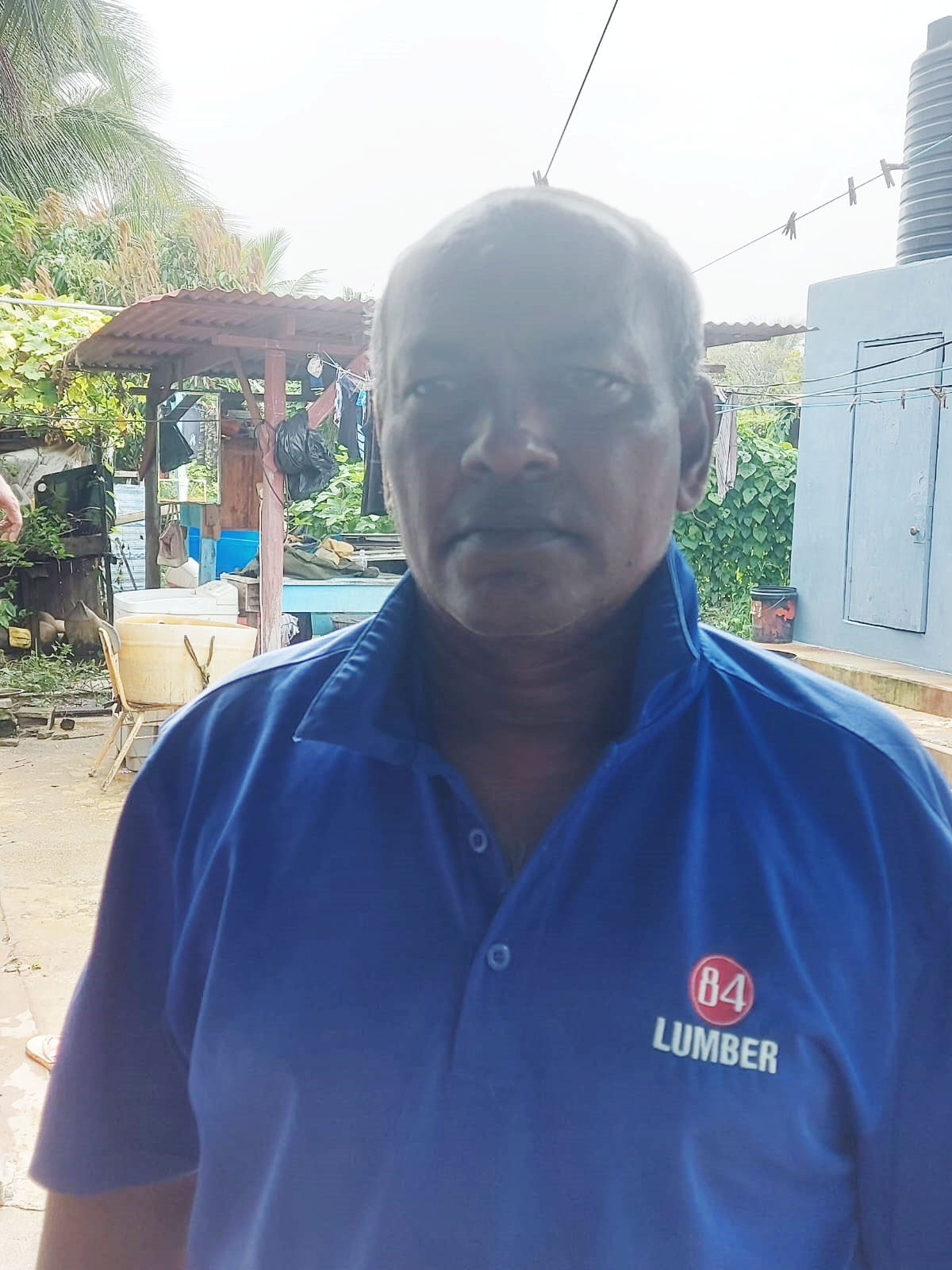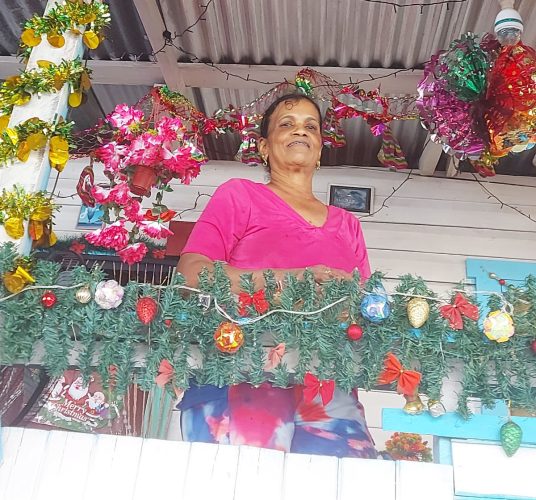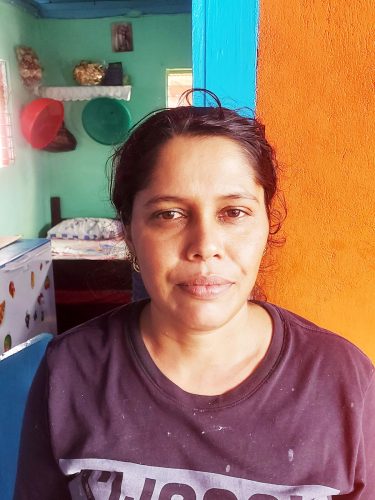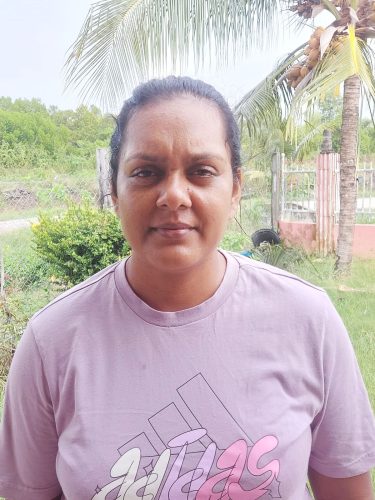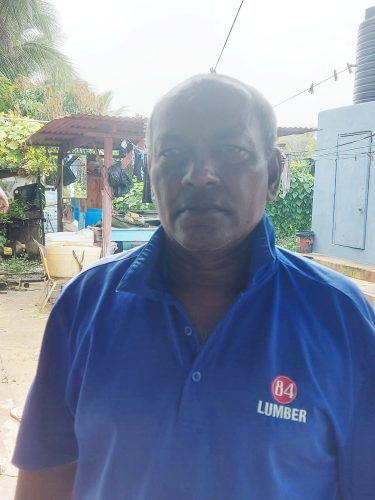Stabroek News spoke to members of the public in the area of Good Faith, Mahaicony about the rising cost of living and how it is affecting them. The following are their comments:
Ramlingam Singh, a 40-year-old painter and welder: `The cost for everything going up in the market. On Sunday, my mother went to the Mahaica market and she bought bora at a high price. For example, a couple months back, a small bundle bora cost $500/$600; now, the same bundle of bora cost $800. I know how to budget myself, if you don’t know how to budget yourself then you will find problems when buying items. Sometimes, when I work and receive my payments, the money only last for one or two weeks because the cost for items is high. For example, a couple months back, a pound of chicken cost $360; now a pound of chicken cost $500/$400 at some places. My family and I can’t afford to buy grocery items all the time because the items are too costly sometimes; my brother and I do part-time work to take care of our mother and pay the utility bills then buy groceries. The government should look into how retailers and wholesalers are selling their items because when items are imported into the country at a cheaper cost, the middlemen continue to sell their products at a higher price.’
Anil Bharrat, a 23-year-old cash crop farmer: `The cost for everything gone up in the market. There are a lot of cash crop farmers in Mahaicony that does not have anything to help with the salt water that seeps in the irrigation system and kill the crops. The government do not give us anything permanently to help with our crops. Our mouth is white for Christmas because of the same salt water. Other farmers can testify to this. Nobody don’t come in the village and they don’t look into anything. I took a lot of loan and I lost (a lot) in cash crops due to the saltwater contamination and sometimes we, farmers do not get water to water the crops. When we do get water, everything gone. We reported the problem many times to a representative from the National Agricultural Research and Extension Institute but still NAREI never tell us anything. A guy who makes all the complaints to the higher authority about these issues affecting farmers on behalf of us said he did report the matter a lots of time to the authority but still, the authorities have not found a permanent solution for the problem. They gave us fertilizers and dig the canal but that doesn’t help; the saltwater still affects us. The cost of living is high right now for me because I have a loan to pay off and I have to maintain my family; the cost for greens high. I sell greens and when people come to buy greens from me, I have to reduce my price to help them out because sometimes they can’t afford it and sometimes I don’t make anything much when I sell…For example, before a pound of celery cost $1000; now a pound of celery cost $4,000. Also, a couple months back, a pound of cabbage cost $160/$200; now, a pound of cabbage cost $500/$600 at some places. I’m a family of five inclusive, of my mother, father, wife and sister. Both my sister and I work to provide for our family. My father assists with planting the crops. I think the government should look into the problem of the saltwater and the cost of living by reducing the taxes since the cost for other grocery items has increase in the market also.’
Quincy Halley, a 40-year-old construction worker: `Well, the cost of living is not just affecting me but the whole family. Every day, week and month when I go into the shop, prices going up and people’s pay remains the same. For the past months I’m home, my boss is overseas and because I’m not working, this is affecting me a lot. I’m a construction worker. I’m a family of eight which includes: my wife, brother-in-law, mother-in-law, daughter, niece and nephew. I try to make the best of what I have to provide for my family. Whatever money I received when I work, I try to focus on the important expenses first before I buy anything else with the money. My brother-in-law works also to provide for his family. For example, a couple months back, a 10-kg Karibee rice cost $1,800/$1,900; now, the same Karibee rice cost $2,500. And, a couple months back, a 50-lbs cylinder cooking gas cost $4,200; now the same cooking gas cost $4,500. The government needs to do something about the cost of living because Guyana is one of the fast moving countries in the Caribbean because we are producing oil now.’
Moses Rangasammy, a 46-year-old cattle farmer: `The cost of living is very high because when you go to the supermarket to purchase items, the cost for soap-powder, a bottle Wesson oil, a bag of rice amount to $10,000. My money finishes quickly. You know what is helping my family and I now is the fact that I have my aunt and brother overseas; they usually send grocery items for us and whatever we do not have, we buy from the supermarket. For example. a couple months back, a medium pack Sunny fresh soap powder cost $1,800; now, the soap powder cost $1,900. I left my job to take care of my sickly mother then I started to rear sheep; I’m a cattle farmer now. I think the government should raise public servants’ salary and when the government raise their salary, then invest on healthcare. Also, I think the government should reduce electricity cost and let pensioners receive a better stipend so people can have more spending power, not with the $100,000 the government is sharing out; that is waste of time.’
Jasmattie Bharrat, a 49-year-old housewife: `The cost of living is really high because the cost for all items is costly to buy. My husband is the only person working in the home. I’m a family of five including, my three sons and husband. We have a kitchen garden and we try with whatever vegetables that grow in the garden. Whatever money I receive from my husband, I use it to pay my utility bills first then buy grocery items. For example, a couple months back, a five-gallon bottle oil cost $8,500; now, the oil cost $10,000. Also, before a big bag Karibee rice cost S8,500 or $9,500; now the rice cost $10,000 for a big bag. We just have to cope with the high cost of living.’
Nazlene Khan, a 62-year-old: `The cost for bread, greens; the cost for everything gone up at the shops/supermarkets. Before…Bakewell bread cost $360; now, the bread cost over $400. Also, a couple months back, a 2-litre drink cost $500; the drink now cost $700. The cost for a tray of eggs gone up in the market. I live alone and collect my disability benefit to pay my utility bills and buy grocery items. Whenever my children can help me financially, they do. If prices for certain items go up this week at the supermarket, I usually cut down on my spending to cope with the cost of living. The government should try to do something about this high cost of living. Also, when the government goes around in the community to share hampers, most of us in the street do not get any; I don’t get anything.’
Zereen Teerbhowan, a 41-year-old housewife: `Well, you know the cost for everything has risen at the supermarket. I noticed whenever I budget to buy a certain items from the supermarket, the cost has increased more. My husband is the sole breadwinner for my family and we try to reduce our cost for items we can’t afford. I have two children going to school and one who has just started working. For example, a couple months back, a pint of split peas cost $140; now the peas cost $140 a pint at the supermarket. Also, a couple months back, a 90-lbs Karibee rice cost $8,000; now the rice cost $9,500. I think the government should do something about the cost of living.’
Chaitra Singh, a 38-year-old housewife: `Well, the cost of living affects us but not to that extent. My husband and I have our own kitchen garden where we plant our own produce to cope with the cost of living. My family and I use a lot of vegetarian food, we don’t use a lot of tin items. All our fruits we get from our farm. We do not buy foreign fruits and other grocery items… I’m a family of four including, my husband and two kids. My husband is a rice farmer; he is the sole breadwinner for the home. I saw that the government reduce the cost for fertilizer since the cost was high during the pandemic. The government is also providing subsidies to farmers for fertilizers. The cost for the pesticide has reduced and I also saw that the miller at the rice factory has increased their money per bag of paddy. So that helps farmers a lot. For example, I think the government is handling the problem where the salt water has seeped into the irrigation system well. Recently, a sluice broke away and flooded the farms belonging to the cash farmers but the government replaced the sluice at Abary and the salt water is prevented from seeping into the irrigation system since there is also a system set up at Burma road which stops the salt water from going into the irrigation system. The cost for grocery items is high but still, we try to cope with it. For example, before, any size of squash cost $100; now the squash cost $700/$1000. Before a pound of sugar cost $60; now a pound of sugar cost $220. The cost of a bottle of Wesson oil gone up also. I think the government should not give us the $100,000 cash grant but put it toward the cost of living and try to reduce taxes so it can benefit everyone including the pensioners.’
Shelly Takie, a 22-year-old housewife: `The cost of living is hard on me because I have two kids and my husband does not get to work every day because he does construction works. Also, my father-in-law is doing the same work and not every day he gets work. So, the cost of living is really hard on us right now financially when buying grocery items and pay the utility bills. The electricity bill also come high every month. Many times, when I don’t get to buy everything that is on my grocery list, I usually buy the important items to cope with the cost of living. For example, before, a 5 gallon bottle oil cost $6,000; now the same bottle oil cost $9,500. Also, a couple months back, a 90-lbs Karibee rice cost $8,500; now the same bag rice cost $10,000/$9,500 at some places. The government should reduce the cost for our items that are produce right here for Guyanese but increase the price for export items because most of our items we purchase right here’.
Ayodhia Roopsingh, a part-time construction worker: `I’m a construction worker and I don’t work every day; whenever I get the work, I go and work. Right now, I have something growing behind my neck that needs cutting and because of that I can’t work also. Every day, I’m awaiting for a call from the doctor to attend to me but I’m not getting through. My family and I try to buy grocery items and store it for hard times. When I’m not working, we go to the beach and catch fish. We can’t plant anything in the yard because our yard usually flood. My brother, wife and two children live together. I’m the sole breadwinner for my family. The cost for everything at the shop gone up; today’s price per items differs from tomorrow’s items. For example, a couple months back, a pound of garlic cost $300/$200; now a pound of garlic cost $500. And, before a pound of chicken cost $260; now a pound of chicken cost $500. The cost for the electricity bill gone up now. My brother who is visually impaired receives disability benefit from the government. Honestly speaking, his money helps us to pay the bills and so. The government should reduce the cost for food items so people like me who work for a low salary, can afford to buy items for my family.’
